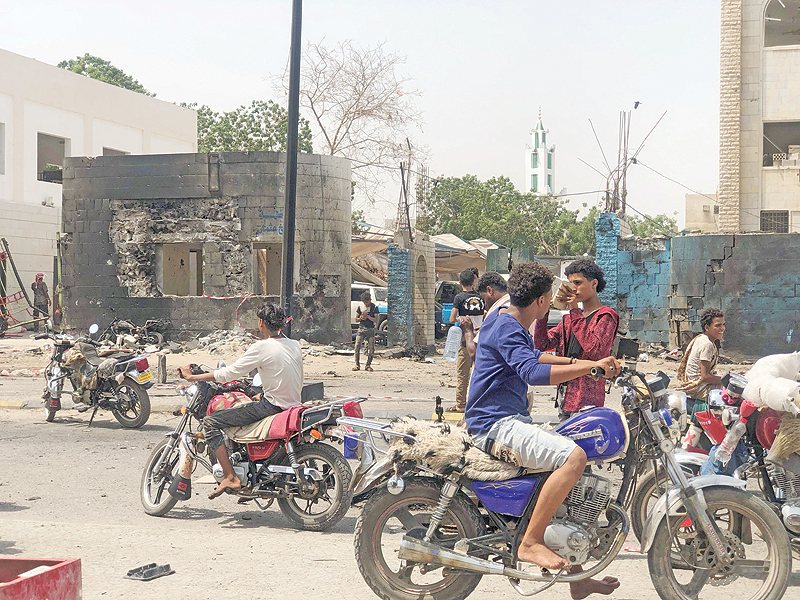Separatists blame Islamists for attack on military parade
ADEN: Yemen's southern separatists yesterday accused an Islamist party of complicity in last week's deadly attack on Aden, the seat of government, exposing rifts in the Saudi-backed coalition battling the Iran-aligned Houthi movement. The separatists and Islamist party are united in their wider war on the Houthis, but have rival agendas for Yemen, and frictions between them over Thursday's attack could destabilize the southern port city that is the coalition's sole stronghold.
The missile strike killed 36 Security Belt soldiers, who are part of the southern separatists, at a military parade. It was claimed by the Houthis, whom the military alliance led by Saudi Arabia and the United Arab Emirates has battled since 2015. The Aden violence, along with an escalation in Houthi missile and drone attacks on Saudi cities, has complicated UN peace efforts to end a four-year war that has killed tens of thousands of people and pushed Yemen to the brink of famine.
The UAE-backed separatist Southern Transitional Council (STC) said the attack aimed to give Islamist party Islah an upper hand in Aden. "This attack was planned to make all of Aden fall into the hands of Islah," STC Vice-President Hani Ali Brik said. Islah, an important ally of internationally recognised President Abd-Rabbu Mansour Hadi, is tolerated by Saudi Arabia but viewed with suspicion by the UAE. "Therefore, do not blame our people if they take to the streets to demand the removal of this government from southern lands," the STC vice-president added at a press conference.
There was no immediate comment from Islah or Hadi's government, nor was there any response in Islah-affiliated media. Islah is viewed by the UAE as an offshoot of the Muslim Brotherhood, which is designated a terrorist group by Abu Dhabi and Riyadh. The attack was the worst violence to hit Aden, a coalition stronghold, since southern separatists clashed with Hadi's government in 2017 in a power struggle.
Iran accused
Saudi and Yemeni officials have publicly accused Iran of being behind the attack and a separate one in Aden that day claimed by militant group Islamic State. Tehran denies any involvement in Yemen. The Western-backed, Sunni Muslim coalition intervened in Yemen against the Houthis after they ousted Hadi's government from power in the capital Sanaa in the north in 2014. The government is now based in Aden while the Houthis control most other urban centers. The war has revived old strains between north and south Yemen, formerly separate countries that united into a single state in 1990 under slain former President Ali Abdullah Saleh.
Local officials and residents in Aden said many northerners in the city had been expelled to nearby Houthi-held territories in recent days in a move condemned by Hadi's prime minister and the United Nations' human rights body. Analysts say the Houthis may have attacked the parade precisely to exploit coalition weaknesses after the UAE in June said it had scaled back its presence in the south and western coast, where it has armed and trained some 90,000 troops.
"The attack proves that the priority remains (to combat) the Houthi coup, extremism and terrorism," UAE Minister of State for Foreign Affairs Anwar Gargash tweeted yesterday, without mentioning the STC accusations against Islah. Western allies, some of which supply arms and intelligence to the coalition, have pressed for an end to a war widely seen in the region as a proxy between Saudi Arabia and Tehran. The Houthis deny being puppets of Tehran and say their revolution is against corruption.- Reuters










